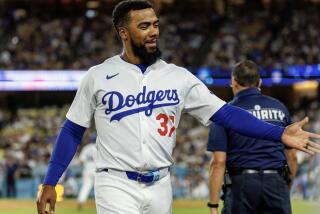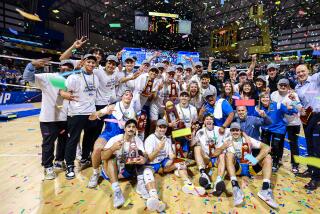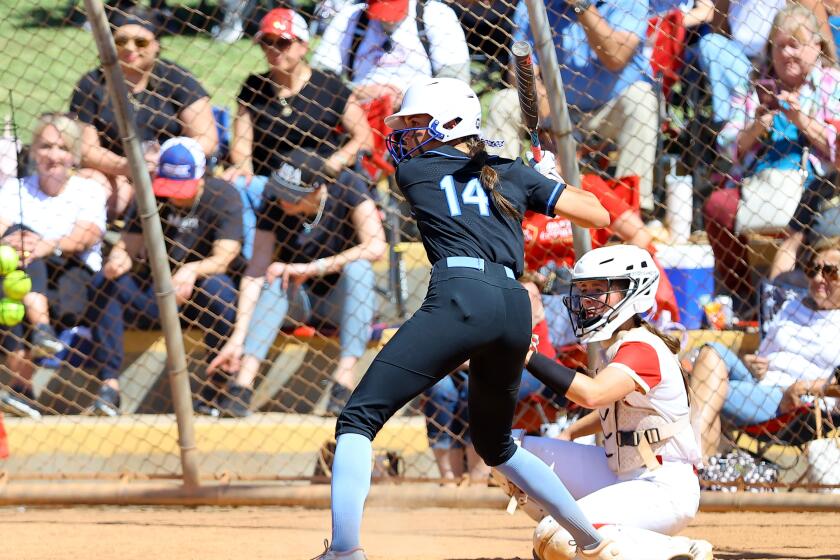Teltscher Was One of the First to See Long Beach Teen’s Talent
- Share via
Once again, it was a long day of teaching tennis, and Eliot Teltscher was tired and not especially enthused when another kid, a 12-year-old, walked out on the court for a lesson.
“I was thinking, ‘Oh brother,’ ” Teltscher said.
The child was hardly a prodigy, not even one of the top-ranked youngsters in Southern California. Whenever Teltscher worked with a new kid, he would evaluate them by playing a game up to 11 points.
The 12-year-old won.
“He moved well for his age and he saw the court well and competed,” said Teltscher, a former top-10 pro player. “He wasn’t intimidated at all and had a little bit of that edge.”
The youngster with an edge? Phillip King of Long Beach.
His moxie that day caught Teltscher’s attention, and Teltscher, now a USTA national coach, chuckled when recalling the story Saturday. That lesson was the beginning of their successful association--one leading to two of the most prestigious junior titles this year, the Easter Bowl, and a week ago the 18-and-under National Championships at Kalamazoo, Mich.
The Kalamazoo victory earned King a wild-card spot in the main draw of the U.S. Open, which starts later this month. And Teltscher? He got something quite necessary for his 8-month-old daughter.
“He made a bet on me, for me,” King said. “It was a friendly bet.”
Said Teltscher: “I won a package of diapers,” he said. “Size three, Huggies Supreme. Diapers are big in our house.”
The bet had to be a good sign, King thought. He said Teltscher has never committed an unforced error in the department of advice.
“How many guys out there have been in the top 10?” King said. “He’s been there already. I kind of feel like a child when he’s out on the court. In the four, five years I’ve been with him, he’s never been wrong. He’s predicted everything.”
Predicting the future for junior tennis players is like trying to judge the long-term success of Internet stocks on the market. Some Kalamazoo winners have gone on to great success, but just look at the years of 1986 and 1987: Al Parker won in 1986 and Michael Chang in 1987.
Al who?
“I hate predictions,” Teltscher said. “Having said that, he [King] has good foot speed. But he needs to put on 20-25 pounds of muscle. He’s got a lot of things he does well. His game will only get better. It’s gotten a lot better in the last year, he’s hitting the ball deeper and his serve has improved.”
King is only 17, but he impressed observers by his intelligent observations after losing to Pete Sampras in the first round of the Mercedes-Benz Cup at UCLA. It was his first major ATP tournament.
He will play the U.S. Open junior event as well, but that most likely will be his final junior tournament. For now, King retains his amateur status.
One of the more fascinating aspects of King’s development is that he was trained in his early years by his father, David. David King, who came to the United States from Taiwan almost 20 years ago, didn’t have any formal background in the sport.
“I think it almost helped me,” Phillip King said. “Everything I learned was on my own. There was nobody out there to lose it for me. Every match won was experience.”
Phillip and his three younger sisters, 12-year-old twins Mindy and Ivana, and 10-year-old Vania, formed their games by working out with their father on the courts at Long Beach Wilson High for hours and hours.
“I trained out there all the time,” King said. “I personally wore those courts out. He drilled us until his wrists hurt and he kept on going some more.”
He said his youngest sister is a lot like him. All three girls are excellent age-group players.
“The twins still play like they’re twins--everything is together,” he said. “She [Vania] is feisty because she has to face them [the twins] every day.”
Teltscher agreed.
“One was even feistier than Phillip,” he said. “I called her by the wrong name and she gave me this look, ‘Don’t ever do that again.’ I said, ‘Phillip, I’m scared of your sister.’ ”
The tennis architect, David King, shares at least one quality of Pete Sampras’ father, Sam. He doesn’t like to watch his son play. He admits he gets too nervous and said that “he cannot help” his son from the sidelines.
At the UCLA tournament, he warmed up with Phillip and promptly departed the premises half an hour before the match.
With success, things are changing for the Kings. Reporters are calling the house and management companies are interested in his son.
“I was always hiding Phillip. I don’t know where to hide him now,” David King said, laughing.
More to Read
Get our high school sports newsletter
Prep Rally is devoted to the SoCal high school sports experience, bringing you scores, stories and a behind-the-scenes look at what makes prep sports so popular.
You may occasionally receive promotional content from the Los Angeles Times.







